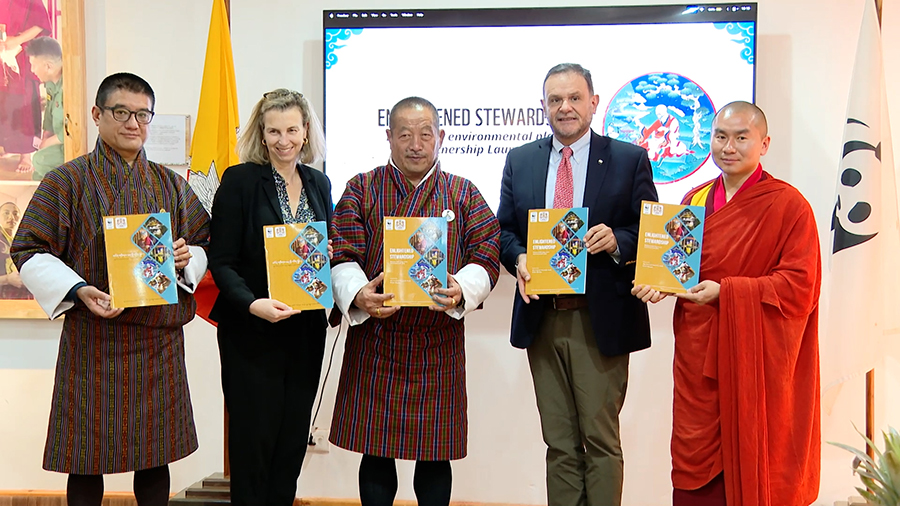 In a bid to address some of the environmental challenges in the country, the World Wildlife Fund Bhutan launched two new projects. The projects aim for proper waste management for a clean environment and to improve the livelihoods of villagers. The Minister for Energy and Natural Resources along with other officials launched the projects recently.
In a bid to address some of the environmental challenges in the country, the World Wildlife Fund Bhutan launched two new projects. The projects aim for proper waste management for a clean environment and to improve the livelihoods of villagers. The Minister for Energy and Natural Resources along with other officials launched the projects recently.
One of the projects titled “Faith Long-term Environmental Plan”, is being carried out by the WWF Bhutan in collaboration with the Central Monastic Body.
Also known as Enlightened Stewardship, the partnership project will strive to implement the long-term plan by engaging organisations, communities and youth to raise awareness on environmental conservation.
Tandin Wangdi, the Programme Lead said that their plan is to start the project from a monastery, where the monks will take care of their surroundings. It will be implemented as a pilot project from that monastery. Monks will manage their waste, use energy efficiently and maintain a clean environment.
Tandin Wangdi, Programme Lead of Stewardship & Education in WWF Bhutan said “That particular monastery will serve as a kind of a demonstration Goenpa so that the people living around them, the local people, look at it and say that, oh, this is something that we need to adapt, this is something we need to practice and they actually copy from the monasteries and they practice at their homes.”
Similarly, the Climate Crowd Initiative is another project which will be implemented by the WWF Bhutan in partnership with the Department of Forests and Park Services.
Sonam Dagay, Programme Specialist of Climate & Energy at WWF Bhutan said “Climate crowd initiative is a bottom-up community-driven approach to help people adapt to changing climate regimes, especially focusing on people living within the protected area systems.”
For this project, the WWF carried out informal interviews to understand the community’s perspective about climate change, and its impact on their livelihoods and nature around them.
The project was designed after interviewing over 100 community members residing in Jigme Dorji National Park and Jomotsangkha Wildlife Sanctuary.
75 community members were interviewed from the Jigme Dorji National Park and over 60 percent of the respondents reported that there is less wild food around their communities, especially cordyceps and medicinal herbs.
People often collect these for their livelihoods, so with a decreased abundance of these plants and fungi, some respondents found themselves with less income.
Over half of respondents reported that there has been a decrease in the availability of water and their usual water source has dried up.
So, the Climate Crowd Initiative aims at securing drinking and irrigation water while providing alternative means of livelihood and reducing human-wildlife conflicts in the communities.
Sonam Dagay said “For Soe and Yaksa villages, we will be establishing incense processing units to supplement their income. And for Draagchhukha we will be improvising a chain link fence using live fence to promote human-wildlife coexistence and then for Langchenphu and Samrang gewogs, we will be working on reviving and restoring the water supply for the two communities.”
Climate Crowd is an initiative that works with communities and local organizations in over 30 countries.
Devika Pradhan
Edited by Tshering Zam








